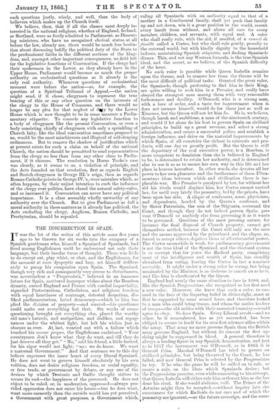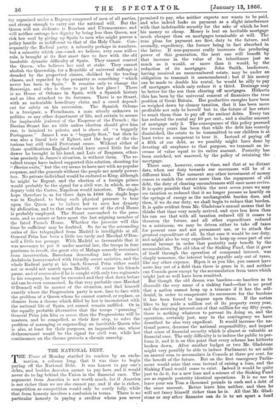THE INSURRECTION IN SPAIN.
TT was the lot of the writer of this article some five years ago to be thrown for six weeks into the company of a Spanish gentleman who, himself a Spaniard of Spaniards, had lived among Englishmen until he understood not only their language, but their insular turns of thought. There was little to do except eat, play whist, or chat, and the Englishman, for the moment at once dyspeptic and lazy, set himself deliber- ately to pump his companion upon Spain. The Spaniard, though very rich and consequently very averse to disturbances, was nevertheless a " Progressista," believed in an immense future for Spain, muttered improper wishes about the Bourbon dynasty, cursed England and France with cordial impartiality, regarded Protestantism, Catholicism, and religious freedom with equal heartiness of contempt, detested despotism, dis- liked parliamentarism, hated democracy—which to him im- plied the division of property—and wanted—his questioner could make out everything but that. Six weeks of cross- questioning brought out everything else, placed the worthy old man's hatreds, and antipathies, and dislikes, and repug- nances under the whitest light, but left his wishes just as obscure as ever. At last, wearied out with a failure which touched his amour propre, the Englishman exclaimed, " Your countrymen don't know what they do want, and till they do just deserve all they get." "No," said his friend, a little fretted, for his cigar would not light, "no ; we do know. We want a maternal Government." And that sentence we to this day believe expresses the inner heart of every liberal Spaniard. He does not want to govern himself absolutely by his own volition, does not desire religious freedom, or social equality, or free trade, or government by debate, or any one of the devices by which Teutonic and Gallic thought strives to secure its end—the happiness of the governed. He does not object to be ruled, or, in moderation, oppressed—always pro- vided oppression does not enter his house—but he does want, want more earnestly than the outside world has yet perceived, a Government with great purposes, a Government which,
ruling all Spaniards with an authority equal to that of a mother in a Continental family, shall yet push that family up and not down, win it a great position in the world, resent every insult from without, and above all care for every member, children, and servants, with equal zeal. A ruler who shall really rule, with the aid, if needful, of a cowed de fainille called a Cortes, but who shall rule gently, proudly to the external world, but with kindly dignity to the household indoors, maintaining Spanish etiquette, and finding Spaniards dinner. This, and not any Western formula, is the true Spanish ideal, and the secret, as we believe, of the Spanish difficulty of the hour.
No such ruler is possible while Queen Isabella remains upon the throne, and to remove her from the throne will be the most difficult of political tasks. Granted the great ruler, the Spaniards, though preferring to find him in their King, are quite willing to seek him in a Premier, and really have obeyed the strongest man among them with very reasonable forbearance and docility. O'Donnell, who is a strong man, with a love of order, and a taste for improvement when it does not menace himself, would do for them just as well as Ximenes, but the Queen will not let him do. He is, we believe, though harsh and ambitious, a man of the nineteenth century, and would if let alone do his best to govern Spain on civilized principles, to build up a great revenue, and select a strong administration, and create a successful police, and establish a foreign influence, and drive on the material improvements by which Spain, of all countries the richest in minerals and pro- ducts, will one day so greatly profit. But the Queen is still the depositary of the real executive power, is a Bourbon, is more competent to dominion than she is believed in England to be, is determined to retain her authority, and is determined also to use it so as to secure her own way in this life and her place in heaven hereafter. In other words, she devotes all her power to her own pleasures and the furtherance of thoae Ultra- montane ideas between which and civilization there is im- placable war. Her Premier is paralyzed by her, for without her aid his rivals would displace him, her Cortes cannot control her, for until very lately the peasantry, led by the priests, have been upon her side. A clique of confessors, nuns, physicians, and dependents, headed by the Queen's confessor, and by Sister Patrocinio, the nun of the Stigmata, surround the Court, and though they do not indeed govern Spain, pre- vent O'Donnell or anybody else from governing it as it wants to be governed. Questions of the most pressing nature, for instance the final disposal of Church property, cannot get themselves settled, because the Court will only use the men and the means approved by the priesthood and the clique, or, forced to accept others, deprives them of all substantial power. The Cortes meanwhile is weak, for parliamentary government is not the true ideal of the Spaniard, and the electoral system is so corrupt that for years the Radical party, comprising most of the intelligence and wealth of Spain, has steadily abstained from voting, leaving the Cortes in fact a nominee assembly. It might under a strong ruler be strong, but being nominated by the Minister, is as desirous to march on as he is, and like him is checkmated by the Queen.
England had nearly the same situation to face in 1688, and, like the Spanish Progressistas, she recognized as her first need a new ruler. Moreover, she knew that such a ruler, to suc- ceed in the face of the lingering belief in divine right, must at first be supported by some armed force, and therefore looked to a man who could bring troops, and whom the native leaders of troops—the old nobles with their mounted tenantry—would agree to obey. So does Spain. Every Liberal revolt—and no other, be it remembered, has as yet succeeded, has been obliged to secure to itself for its own first advance allies within the army. That army no more governs Spain than the British army governs England, but without its consent the first up- rising might be suppressed in blood. A general therefore is always a leading figure in any Spanish demonstration, and just as in 1857 the instrument was O'Donnell, so in 1865 it is General Prim. Marshal O'Donnell has tried to govern on civilized principles, but being thwarted by the Court, he has failed, and now General Prim is selected by the Progressistas to try. If he wins the game he will be called on to rule, or create a rule, on the ideas which Spaniards desire ; but the Progressistas perceive, even while consenting to his attempt, that Queen Isabella will either rule him orthwart him as she has done his rival. If she would abdicate, well. The Prince of the Asturias might then be accepted,—without inquiry into cir- cumstances for which Radicals do not care and of which the peasantry are ignorant,—as the future sovereign, and the coun-
try organized under a Regency composed of men of all parties, and strong enough to carry out the national will. But the Queen will not abdicate, is Bourbon and Ultramontane, and will neither outrage her dignity by being less than Queen, nor risk her soul by giving up Spain to men who might pursue a policy hostile or indifferent to that of the Holy Chair. Con- sequently the Radical party, a minority perhaps in numbers, but a minority which can—and, we believe, very soon will— rule, is brought at its first onset face to face with the old insoluble dynastic difficulty of Spain. They cannot control the Queen, who believes her soul at stake. They cannot abolish the Queenship, for a Republic of universal suffrage is dreaded by the propertied classes, disliked by the trading classes, and regarded by the peasantry as something "which never has been in Spain." It remains only to change the Sovereign, and who is there to put in her place ? There is no House of Orleans in Spain, with a Spanish history and an idea attached to its fortunes. There is no Stuart, with an undeniable" hereditary claim and a creed depend- ent for safety on his succession. The Spanish Orleans is a foreigner, a Frenchman, a man utterly unknown in politics or any other department of life, and certain to arouse the implacable jealousy of the Emperor of the French ; the Iberian Stuart has no title unless election should give him one, is inimical to priests, and is above all " a beggarly Portuguese." James I. was a " beggarly Scot," but then he was also a lineal heir of Egbert, and the hope of the vic- torious but still timid Protestant cause. Without either of those qualifications England would have cared little for the dower he brought in his hand, and Luis of Braganza, other- wise precisely in James's situation, is without them. The re- volted troops have indeed supported this solution, shouting for " lbericaunita," but the cry seems to have met with no popular response, and the generals without the people are nearly power- less. No private individual would be endured as King, although he might be Regent, and the election of a foreign prince would probably be the signal for a civil war, in which, as one deputy told the Cortes, Napoleon would interfere. The single hope therefore is, as for three days in 1688 the single hope was in England, to bring such physical pressure to bear upon the Queen as to induce her to save her dynasty by abdication, and to that end the menace of the rival House is probably employed. The Stuart succumbed to the pres- sure, and so sooner or later must the last reigning member of the fated French House. Whether the pressure will this time be sufficient may be doubted. So far as the astounding series of lies telegraphed from Madrid is intelligible at all, General Prim has been a little too tardy and Marshal O'Don- nell a little too prompt. With Madrid so favourable that it was necessary to put it under martial law, the troops in four- garrisons in revolt, the great city of Malaga scarcely restrained from insurrection, Barcelona descending into the streets, Andalusia honeycombed with friendly secret societies, and the whole Radical party at his back, General Prim either could not or would not march upon Madrid. Of course his friends pause, and of course also if he is caught with only two regiments in his company, he may be executed and they shot down before aid can be even summoned. In that very probable case Marshal O'Donnell will be master of the situation, and find himself exactly where the Progressista party is now, face to face with the problem of a Queen whom he cannot control, or replace, or dismiss from a throne which filled by her is inconsistent with the national life of Spain, yet cannot remain unfilled. Or in the equally probable alternative that the troops " pursuing " General Prim join him en masse, then the Progressistas will be masters, and be compelled, as their first step, to solve the problem of managing or superseding an inevitable Queen who is also, at least for their purposes, an impossible one, whose dethronement would be the signal for civil war, while her continuance on the throne protects a chronic anarchy.































 Previous page
Previous page